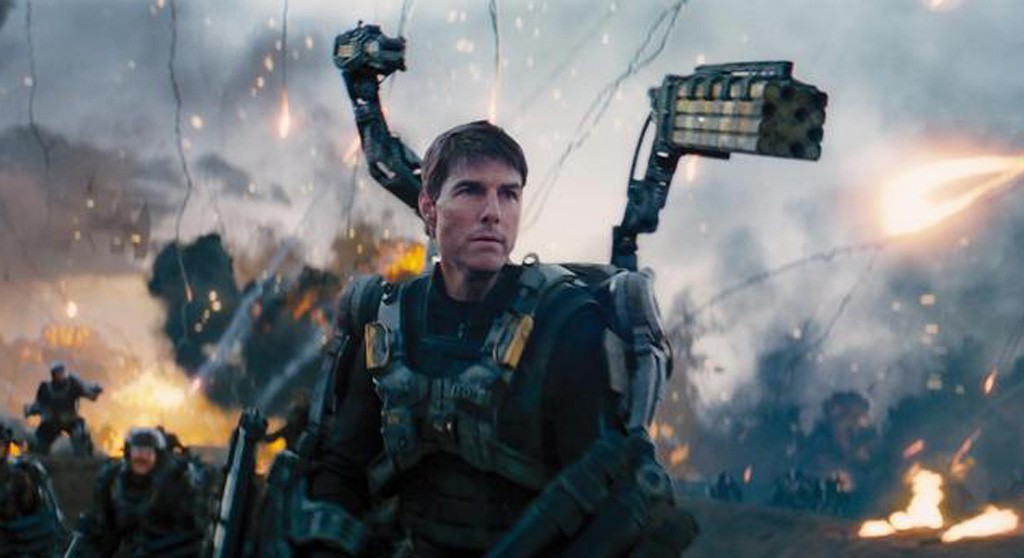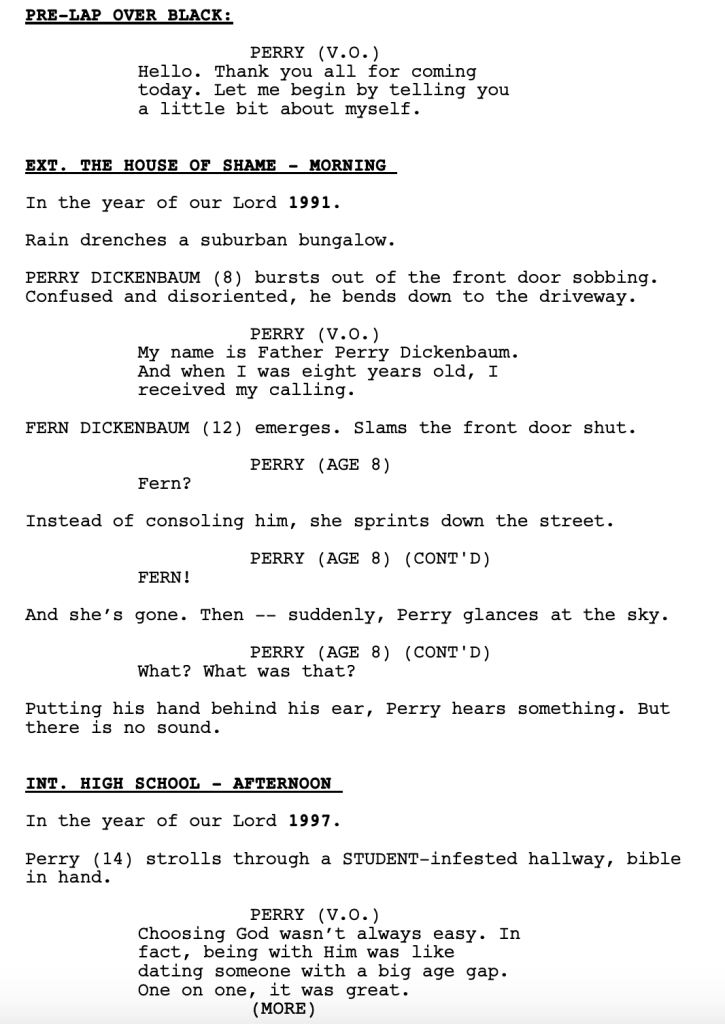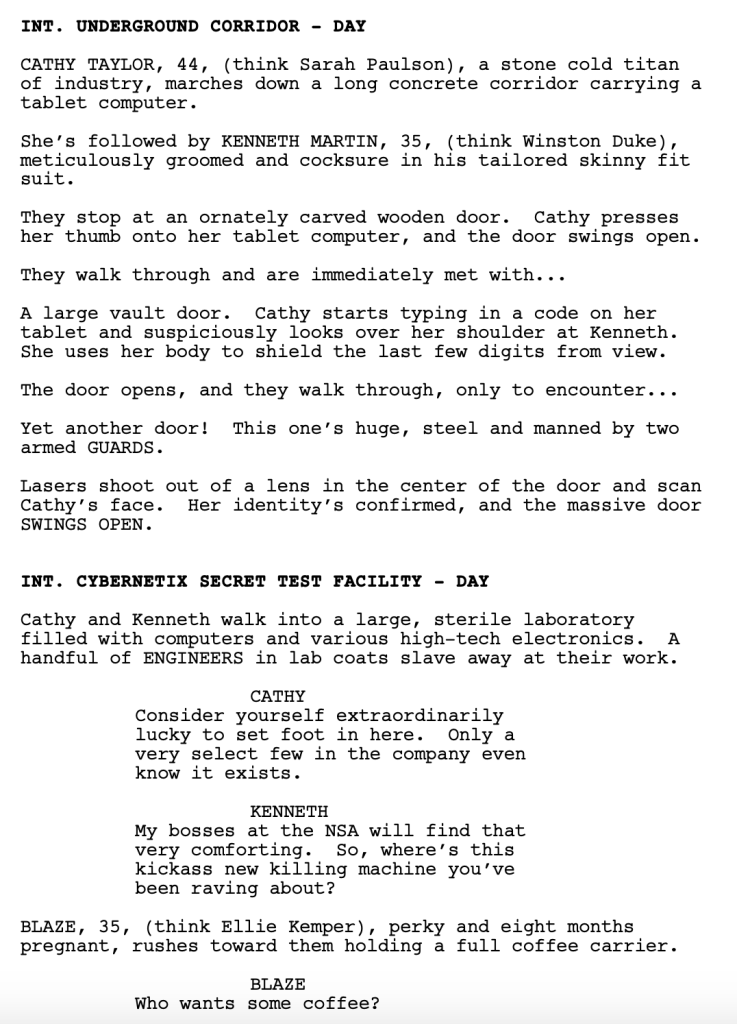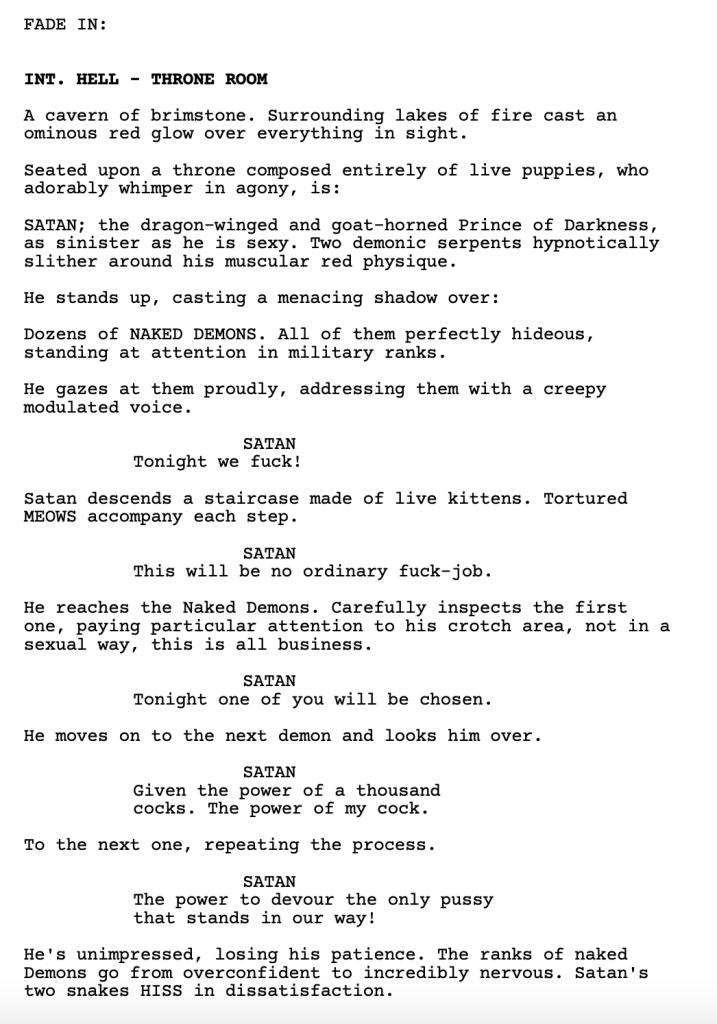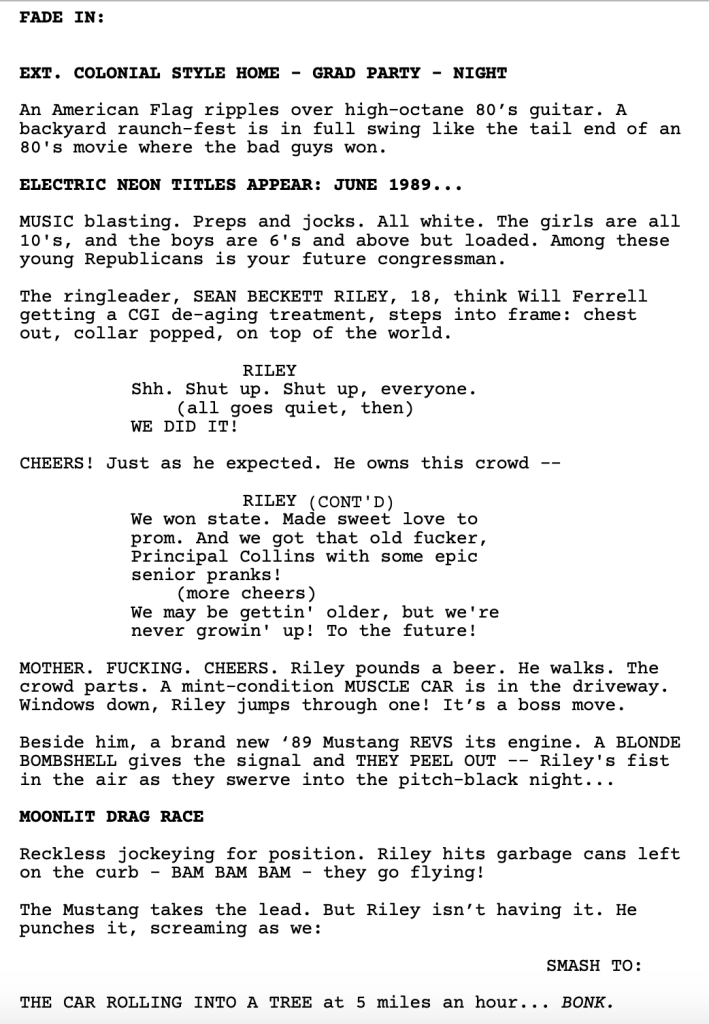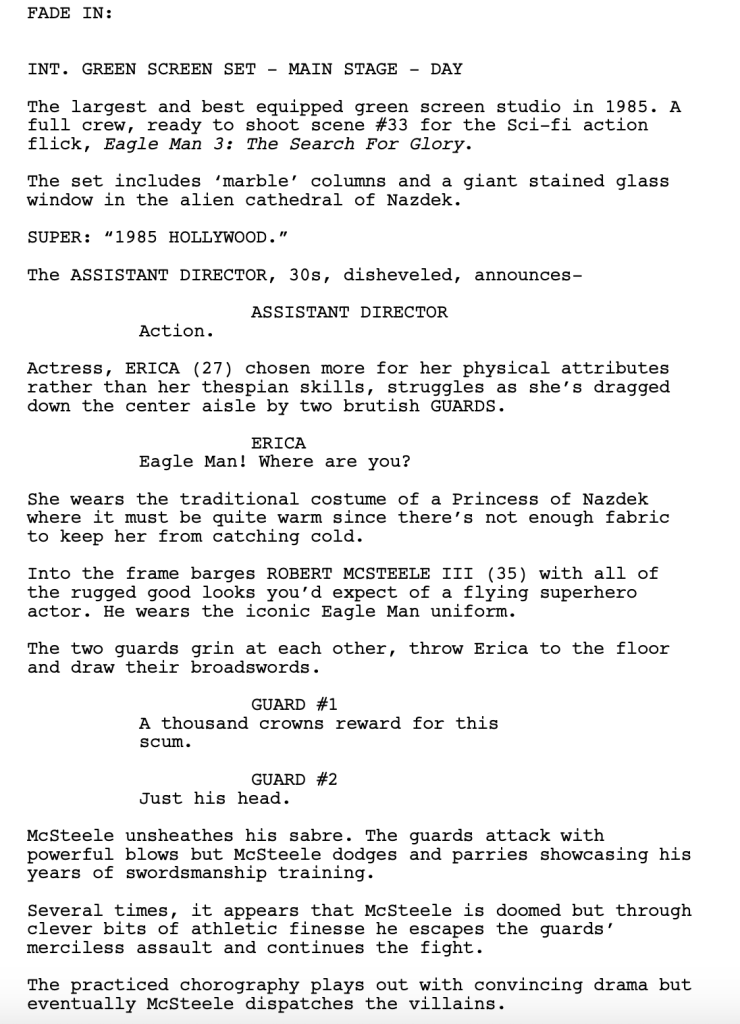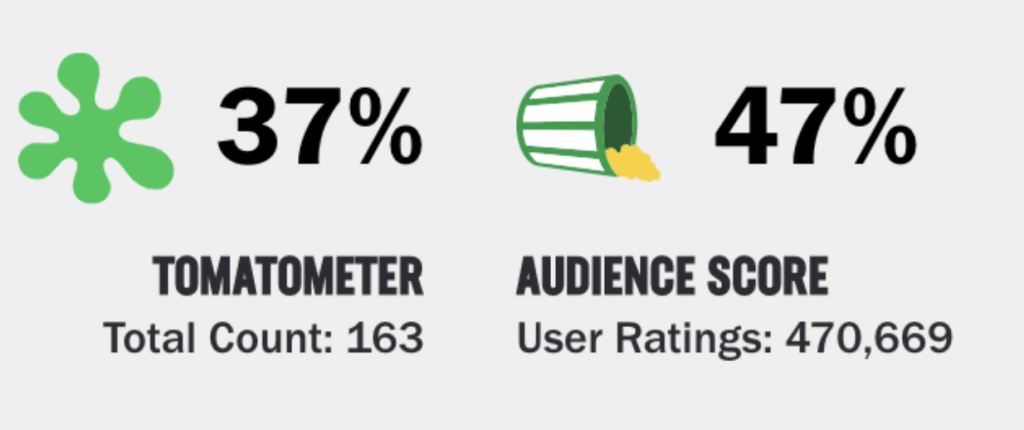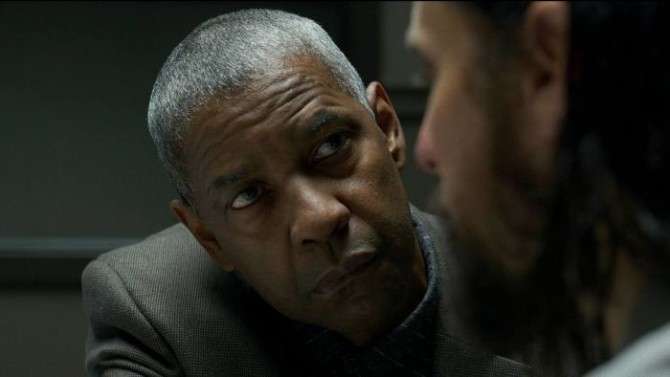When it comes to being pigeonholed, producing isn’t that different from writing or acting. You usually have a bunch of scripts you’re trying to get made. After pushing and pushing, one of those scripts finally breaks through and gets produced. Whatever the genre of that script is, that’s what you become known for for the foreseeable future. You may want to produce Westerns. But if you just broke through with a Musical, you become the “Musical Guy.”
Well, in a world where I get to choose which genre I break in with, without question, it would be sci-fi. I looooovvve sci-fi. So this next Showdown is personal for me. I want to find and produce a kick-ass science-fiction movie. So let’s make it official. Sci-Fi is the next Amateur Showdown on Scriptshadow!
What: Sci-fi Showdown
When: Entries due by Thursday, September 16th, 11:59 PM Pacific Time
How: Include title, genre, logline, Why We Should Read, and a PDF of your script
Where: Carsonreeves3@gmail.com
Now that we know what the showdown is, let’s talk about what I’m looking for. The best gauge for which concepts I’ll respond to is which Sci-Fi movies I love. Here is that esteemed list…
Terminator
Alien
Aliens
The Matrix
Ex Machina
Children of Men
Source Code
Cloverfield
Cloverfield Lane
Minority Report
Moon
Edge of Tomorrow
District 9
Mad Max
Mad Max: Fury Road
The Martian
Gravity
Inception
Arrival
Annihilation
Contact
The Fly
Invisible Man
Upgrade
Invasion of the Body Snatchers (1978)
A Quiet Place
Predator
Hunger Games
Escape from New York
12 Monkeys
Jurassic Park
The Thing
And here are some concepts I liked, but didn’t quite love the execution…
Ad Astra
Soylent Green
War of the Worlds
Gemini Man
Logan’s Run
Sunshine
Demolition Man (would love a non-cheesy version of this)
Needless to say, I would prefer entries with manageable budgets. The more money you’re asking for, the less buyers you have. So look at it like this. Anything that would cost under 10 million dollars is great. I know that’s not a lot. But they made Upgrade for under 10 million. Moon was made for under 10 million. The Invisible Man. Ex Machina. Creatively frugal versions of “The Fly” and “Invasion of the Body Snatchers” could be made for under 10 million. Both “Alien” and “The Thing” could probably be made for under 10 million.
The next tier up is “Under 50 million.” When you get to this kind of money, the concept has to be really good. Ex Machina – which was a psychological thriller about a man and a robot – is not a big enough idea to spend 50 million dollars on. That’s the kind of idea that needs to cost less than 10 million. You need to be thinking bigger in this budget bracket. A 2021 “Predator” type movie could be made for under 50 million. A toned down “Martian” could be made for 50 million (without an expensive A-list star and the expensive ship rescue at the end). Cloverfield could be made for 50 million. Terminator could be made for under 50 million. Source Code was well under 50 million.
The next tier up is 100 million and it’s very hard to get anything made in this range unless it’s based on established IP. So I would say if you’re planning on submitting something in this budget range, the concept needs to be amazing. The Hunger Games is a good example. Minority Report. Inception. Notice that all of these are BIG IDEA concepts. A competition where a group of children fight to the death. A futuristic thriller where you’re arrested for murders you haven’t yet committed. A heist that takes place in the dream world. If you don’t have an idea as cool as one of these, I wouldn’t write anything in the 100 million dollar space.
Finally, you have the 100 million and above sci-fi movie. These are your Star Wars’s. Your Guardians of the Galaxys. Your Jurassic Parks. Your Edge of Tomorrows. My suggestion to you? Don’t submit these to Sci-Fi Showdown. They’re impossible to get made. I would even extend that advice beyond Sci-Fi Showdown. You shouldn’t be writing these. The one exception is if you want a writing sample for those big Star Wars and Marvel assignments.
I’ve just given you a ton of movies for reference. But, as we all know, you can’t just copy a movie you like. You need to find a fresh new angle. I’m sure that you’ve had the experience of, after falling in love with a band’s debut album, eagerly buying their second album, only to find out all the songs sound the same as the previous album. There’s nothing new so you quickly grow bored. It’s the same thing with movie ideas. You can be inspired by old sci-fi movies. But you can’t copy them. You can’t reimagine Predator and just change the jungle to a desert. That’s a stale way to upgrade an idea.
One of the best ways to come up with sci-fi ideas is through other genres. Take a Western like High Noon and set it on an alien planet. Take a war movie, like the first 20 minutes of Saving Private Ryan, and give it a sci-fi spin (Edge of Tomorrow). Take Joseph Conrad’s classic novel, Heart of Darkness, and instead of traveling deep into the heart of a country, travel to the edge of the solar system (Ad Astra). Take a Tom Hanks movie about being stranded on an island but turn the island into Mars (The Martian).
Is there a version of “The Fugitive” that could be turned into a sci-fi movie? What about “Drive?” How bout “Sicario,” except people are smuggling drugs between planets as opposed to across borders. John Wick’s DNA feels like it could be altered to create several different sci-fi offshoots. A top assassin in the future who has to take out a syndicate. Or a time-travel assassin. Let your imagination go crazy.
Another way to find sci-fi ideas is to change the traditional POV (point-of-view). Ben Ripley famously figured this out during his rewrites of Source Code. He originally had the movie take place after a train crash with a detective investigating the aftermath. He eventually figured out that it would be more interesting if the POV was with someone ON THE TRAIN before it crashed. That turned a slow moving procedural into one of the fastest and coolest scripts in history.
Cloverfield is another example. We’d seen big monster movies before. But we’d never been limited to first-person-perspective camera glimpses of the monster over the course of 100 minutes. Sometimes it’s a single clever thought that can turn a standard sci-fi flick into something special. We’d seen aliens trying to kill humans a million times over. But we’d never seen aliens who hunted by sound, which meant the only way for humans to survive was not to make a sound (A Quiet Place).
You have to get inventive if you’re going to be the one to come up with that great sci-fi idea. To wrap this up, let me give you a few concepts I don’t want. Do not send me anything big and messy, like Interstellar or 2001. Don’t send me anything with 10,000 characters and an endless mythology, like Dune. I dig the core concept of Blade Runner (special cops tasked with terminating “replicant” androids) but I’m not interested in all the artsy-fartsy stuff that slows that film down. I’d prefer a faster-moving sci-fi movie to a slow one. I’m not looking for goofy sci-fi stuff like Men In Black or Independence Day. That format feels dated to me.
Finally, as is the case with all art, feel free to ignore everything I just said and write whatever inspires you. Sometimes the best ideas go against all logic. If you’re inspired by an idea, chances are other people will be as well.
I’m really REALLY looking forward to this Showdown. I can’t wait to see what all of you have in store for it.
And guess what? The competition begins… NOW.
Start sending those entries in! :)
IT’S FINALLY HERE!!!
As I combed through all of the comedy submissions, it became clear to me that three things would determine which scripts made the showdown. One, you had to have a funny marketable concept. Two, you had to be funny (your first page should’ve made me laugh). And three, you had to know how to write. Even a good concept and a funny writer can fall apart if the writer doesn’t know how to write a screenplay.
It also became clear to me that when you’re dealing with not-yet-professional writers, finding all three of these things in a single script would be hard. With that said, I have a feeling one of these scripts is going to be a standout. I not only read every logline submitted. I also read the first page of every entry. And, on that front, we have some really promising scripts.
If you haven’t played Amateur Showdown before, it’s easy. Read as much of each script as possible then vote for your favorite in the comments section. Voting ends 11:59 PM Pacific Time, this Sunday (June 20th). The script with the most votes will get a review next Friday.
By the way, a quick WHAT I LEARNED for all of you comedy writers. Be funny in your query. Don’t go over the top. But include one or two little jokes in your e-mail to let that manager/agent/producer know you’re funny. I went into scripts much more excited if the writer made me laugh in the e-mail. Here’s an example from one of the scripts that made today’s showdown – “Every once in a while, a movie comes along that changes the game. It makes people question the world and rethink their purpose in life. Well, this ain’t that kinda movie!”
Enough dilly-dallying! Time to start reading! Congratulations to all of you who made it. For those who didn’t, feel free to post your title and logline in the comments and if I have time, I’ll give you some quick feedback on why your script wasn’t chosen.
Good luck to everybody!
Title: God, I Need to Get Laid
Genre: Comedy
Logline: A priest renounces his calling and vows to lose his virginity, but being on the rebound from God makes it all-encompassingly difficult.
Why You Should Read: Instead of Carson’s recommendation to write Slutty Nun, this story is about a Slutty Priest. Even though, at times, it’s a raunchy sex comedy, the real core of the story is about moderation. And, while there are plenty of jokes made at the expense of religion (especially in its extreme form), it tries to show that religion in itself has plenty of good stuff to offer. Thanks for checking it out.
Title: Droid Rage
DROID RAGE SECOND LINK (IF FIRST LINK NOT WORKING)
Genre: Comedy
Logline: A failing android salesman and a train wreck of a computer repair woman are forced to run for their lives after they become the target of a relentless and charming top secret android killing machine. Think “Planes, Trains and Automobiles” meets “The Terminator” if Arnold was played by Ellie Kemper.
Why You Should Read: Every once in a while, a movie comes along that changes the game. It makes people question the world and rethink their purpose in life. Well, this ain’t that kinda movie! This is the one that people watch to help them forget about all of life’s heavy bullshit. And here’s the twist: all the comedy in this script comes from the characters and story. This isn’t just another throw a shitload of wacky ideas into a rock tumbler, and six weeks later, you have a polished script with a bunch of jokes and a premise flimsier than a Qanon Covid test. Also, the goals, stakes, and urgency are piled nice and thick to create a juicy GSU sandwich. Plus, you’ll fall SO head-over-heels in love with our main characters that you’ll end up wasting hours of your day online at Zales combing through their engagement rings. BTW, don’t buy diamonds….they’re worthless (you’re welcome!). Anyways, we hope you give this script a chance because we think it’s a real game changer. I know, I know, at the top of this, we said it wasn’t, but that’s another twist! There’s more freakin’ twists than a Simone Biles’ floor routine in just the “Why You Should Read” section: now, imagine what’s going on in the actual script?! More great news, you don’t have to; you can just read it for yourself. Is there anything this script can’t do? Of course there is, it’s just a script! Thank you for your time and consideration.
Title: TWO IN THE PINK
Genre: Comedy
Logline: When an ultra-religious yet porn addicted teen discovers that keeping her virginity is the only way to stop Satan from taking over of the world, she has to team up with a celibate warrior monk to ward off the irresistible Incubus sent from Hell to seduce her.
Why You Should Read: If you don’t follow the worldwide box office, you may be oblivious to the fact that the two highest grossing movies of 2021 are both comedies, that in the middle of a global pandemic, have out-earned both Deadpool movies to become the highest grossing live-action comedies of all time. Now, I haven’t seen either of the Chinese made Hi, Mom or Detective Chinatown 3, but since they were both approved and oversaw by a communist dictatorship, I’m sure they’re fucking hilarious. Meanwhile, the last full year theaters over here were open, the highest grossing comedy the free world’s been able to produce was the Upside. Do any of you remember that hilarious comedy about a suicidal paraplegic? A movie so concerned with checking all the inclusion boxes, but was still able to piss everybody off because it cast Brian Cranston instead of an actual paraplegic. What kind of a world do we live in where the Chinese Communist Party seems to have a better sense of humor than Hollywood? I would try to get to the bottom of this, but the answer to that question would probably make me want to slit my fucking wrists. So instead, I will forgo the autopsy on American big screen comedy and proceed straight to the resurrection. That’s right, just think of Two in the Pink as your own personal screenplay Jesus, here to absolve you of all your comedy sins. The first ever faith-based-teen-sex-comedy for the “me too” era. A story so raunchy that it makes Porky’s look like Paw Patrol. Did anybody ask for this? No, but trust me, it’s just what the world needs right now. If Communist China wants to lead the world in everything else, so be it. But they can have comedy when they pry it from my cold, dead, medium-sized pecker. — I thank you for your consideration. God bless Script Shadow. God bless America. And Hail, Satan!
Title: Senior Prank
Genre: Comedy
Logline: On the last day of high school, two overlooked seniors execute a series of pranks to get their principal fired, while he does everything in his power to catch them and keep them from graduating.
Why You Should Read: It’s a throwback to all those 80’s comedies you know and love but updated for a 2021 audience. In a mash-up logline, it’s Ferris Bueller by way of The Fugitive. Or in a modern-take, it’s Booksmart meets Neighbors — a competition comedy that plays out like a boxing match, round for round with set pieces and surprises galore. All of which I wrote around two likable female leads — true underdogs facing off against their principal in a role that’s written for your favorite middle-aged comedy STAR. This isn’t just a script… this is a MOVIE. A movie I loved writing, and I think it shows. Above all other genres, I love comedies — but I also love action movies – so I wrote a comedy inspired by the structure of a fast-paced action movie – utilizing all that urgency and structuring pranks like set pieces. I also love the coming-of-age high school sub-genre – films that capture incredible characters in that unique time in their lives when they’re old enough to get themselves in a lot of trouble and afraid that everything in their lives is going to change. Senior Prank was a love letter to those movies, one that hopes to thrill and entertain you from page 1 until the very last line.
Title: Stars, Stripes & Swastikas
Genre: Comedy
Logline: A failed movie superhero returns to his crumbling hometown to find it infested with Nazis looking for a lost treasure. He must overcome his fears and failures to defeat the Nazis, recover the treasure and save the town.
Why You Should Read: In the early days of ScriptShadow, this script nearly received a Worth The Read on an Amateur Friday but I couldn’t quite nail down a couple of key sections. Recently, like a bolt from the blue, it became clear to me what I had done wrong all those years ago. And almost simultaneously, Carson announced his Comedy Contest. Obviously, the Gods of Screenwriting have big plans for me. So, after much rewriting, much more than the Gods implied, this beauty is ready for inspection. If you want to stay on the good side of the Screenwriting Gods, you should probably read this script.
Plus, the quickest and easiest strategy to get your script on the Black List.
Frequently, I see comments or receive e-mails regarding all the bad reviews I give to Black List scripts. Readers of the site are confused by the mixed messages. These are, supposedly, the industry’s best scripts! Why, then, are they getting such poor reviews??
There’s a lot going on with the answer to this question so bear with me. The first thing you have to understand about the Black List is that it has too many scripts on it. There were 80 scripts on the 2020 Black List. There’s just no way there are 80 strong screenplays in a year. The Academy Awards has 5-10 movies on its “Best Films” nominated list. Imagine if 80 movies were on that list. Do you think all of them would be good? Half of them? Of course not. So to think we have 80 awesome scripts floating around town each year is silly.
For this reason, you can lop half the scripts off the list right away. The Black List would be better off being more exclusive and only celebrating, say, the top 25 scripts each year. If they did that, the reviews on this site would be a lot different.
Another thing to keep in mind is that many of the scripts on the Black List are not from professional working writers. There are a few reasons for this but one of the big ones is that when you’re an agent/manager trying to get your new client’s script sold (or get them some work), you’re blasting it out to as many people as possible. In the process of doing that, the script gets a lot of exposure. So when it comes time to vote at the end of the year, it’s likely that people will remember that script, even if it wasn’t very good.
Meanwhile, if you’re an already established writer with a half-a-million dollar quote developing something for Ridley Scott, the only people seeing that script are you, Ridley, and Ridley’s two most trusted producers. So when it comes time to vote for the Black List, how is that script going to fare when only 3 people have read it and none of them vote for the Black List?
Now, every once in a while, one of those tightly-developed scripts will leak out, and if it’s good, people will pass it around. As word of mouth builds, more and more people want to read it. That way, when Black List voting comes around, the script gets votes even though it was never officially sent out by an agent or manager. We saw this with Aaron Sorkin when his script, The Social Network, did well one year.
However, by and large, people never see the scripts the industry’s top writers are working on, or even the industry’s middle tier screenwriters are working on, most of whom are probably writing better screenplays than what’s on the Black List.
Another complication that’s thrown a wrench into things is the agency exodus. A couple of years ago, writers left agencies over TV packaging deals and what we found out is that agencies drove a ton of good writing content into the system. Without them pushing scripts, that onus has been placed on managers. And while there are managers out there who know good writing, they can’t make up for the loss of WME, CAA, and UTA.
I’ve seen a NOTICEABLE drop in quality in the 2019 and 2020 Black Lists, which is why you’ve seen so many negative Black List reviews on Scriptshadow over the last two years.
The truth about The Black List is that it mainly celebrates new writers who are still raw but have just enough talent to secure managers. Those managers send their scripts out. And if they’re a big manager with a big reach, their scripts will make the Black List, if not based on quality, then based on exposure.
Let me make something clear. I still think there’s value in making the Black List. It gets you exposure. A lot of scripts on the list end up getting made. And even if your script doesn’t get made, you tend to get assignment work from it. We’ve highlighted this a couple of times this week with Michael Waldron, who made the top half of the Black List several years ago with “The Worst Guy of All Time And The Girl Who Came To Kill Him.” That script resulted in him becoming one of Kevin Feige’s most trusted writers. I don’t think that happens without the Black List.
And the good news is, this gives us a pretty clear path to making the Black List. I’ve told you who the most influential people are for getting scripts on the list – MANAGERS. Therefore, you should be writing for managers. Okay, Carson, but what do managers like? I’ve already told you. They like having scripts that end up on the Black List. Those scripts get their writers work one way or another, which means they (managers) get paid.
Okay, Carson. But what scripts does the Black List like?
The answer to that question changes every few years but I can tell you that, lately, the Black List is leaning more into “message” scripts, kind of like what the Nichol and the Academy do. More specifically, it favors biopics (Gusher, Bikram), people of color persevering (Chang Can Dunk, Two Faced), LGBTQ themed scripts (Forever Hold Your Piece, Occupied), quirky scripts (Bubble & Squeak, Birdies, Possum Song), scripts that espouse liberal values (State Lines, High Society), and true stories (Neither Confirm Nor Deny, Enemies Within).
Genre scripts can make the list. For example, “Emergency,” “Video Nasty,” and “The Culling” all made the list. But these are not the scripts that the Black List would prefer to celebrate.
Now it’s important to note that just writing an LGBTQ script isn’t going to get you a manager. The script still has to be well executed. That means you need a good concept, a strong memorable main character, a clear understanding of the 3 Act structure, a good grasp on GSU (goals, stakes, urgency), and an understanding of how to escalate a story and bring it to a satisfying climax.
Naturally talented writers take about 5-6 screenplays before they get to this level. Less talented writers take anywhere between 7-15 screenplays before they reach this level. If you have little talent, you can still get there by becoming a “workmanlike” screenwriter who makes up for his lack of talent with an unparalleled understanding of storytelling (you know the intricacies of character arcs and dramatic irony and the 50 different ways to add conflict to a scene, etc). But it takes a lot longer.
This is all well and good, Carson. But how do I know where I am? Or how close I am? Well, let’s look at things on a 1-10 scale. The average script that makes the “Top 5” in one of my Showdowns, is a 5 out of 10 script. The bottom half of the Black List consists of, mostly, 6 out of 10 scripts. The top half gets a lot of 7 out of 10s. And when you’re talking about 8, 9, or 10 out of 10, you’re talking about working screenwriters with actual credits.
In other words if you make a Scriptshadow Showdown, you’re very close to making the Black List. You’re only one level away. And, of course, there are plenty of exceptions to this rule. Sometimes a Black List script ends up being a 9 out of 10. Sometimes a professional screenwriter writes a crappy script that tops out at a 5 out of 10. And sometimes a Scriptshadow Showdown produces an 8 out of 10 script, which has happened a handful of times.
These aren’t hard and fast numbers here. But they act as general guidelines as to where you are on your journey. By the way, there’s nothing wrong with ignoring all this noise and writing what you’re passionate about then seeing where the chips fall. That’s a strategy that’s broken a lot of people into this industry. But if you want to be more tactical about it, writing the type of script that both managers and the Black List likes may improve your chances of breaking in.
Your final question is probably: WELL HOW THE HELL DO I GET A MANAGER? Here’s what I would do if I were you. First, download the 2020 and 2019 Black Lists. Under each script, they list the manager (and management company). Write down all those managers/companies, then go get a 7-Day free trial on IMDB Pro, plug all those names into their search engine, and it will give you their contact information.
From there, you can go ‘targeted’ or ‘blanket.’ For “targeted,” only query managers who represent Black List scripts similar to your own. For “blanket,” query every damn manager on the list. In both cases, keep the query simple. Include a brief introduction and your logline. If they like it, they’ll request your script. It’s as easy as that.
And if you want help, I offer plenty of services to help you. I have a logline service for $25 that includes a quick and dirty 150 word analysis and a logline rewrite, a more involved logline service for $40 where we both work on the logline together, and a $50 service for e-mail queries. I know a lot of these managers so I have a good feel for what they’ll respond to. E-mail me at carsonreeves1@gmail.com with the subject line “CONSULTATION” if you’re interested. :)
Today we review the oddest concept on last year’s Black List, all to get ready for December’s “Weird Script Showdown!”
Genre: Fantasy/Sci-Fi
Premise: A young girl creates a robot version of Harry Potter while her father simultaneously is treating Harry Potter star Daniel Radcliffe for a terminal disease.
About: This script finished on last year’s Black List with 10 votes. The brand new writer, Monisha Dadlani, is repped at Verve and managed at Good Fear.
Writer: Monisha Dadlani
Details: 111 pages
23 years ago a writer named Charlie Kaufman took over Hollywood with a screenplay titled, “Being John Malkovich.” It was about a guy who found a porthole into John Malkovich’s mind. This began the “Charlie Kaufman Era,” an era that included half-a-dozen weird concepts with even weirder executions. Whether you liked or disliked Kaufman, you couldn’t deny that he was unique.
There hasn’t been a whole lot of weird stuff since that era. Occasionally we’ll get films like “The Lobster” and “Sorry to Bother You.” But the thing that made early Charlie Kaufman stand out was that he understood character so well. That and he added just enough familiarity to the premise to make it accessible to larger audiences.
Anybody can write a movie about a guy who walks around in an armadillo suit who’s pursuing his dream of becoming an opera singer. In other words, anybody can come up with a weird nonsensical concept. It takes talent to come up with a strange concept that people can relate to and enjoy.
Such is my desire when announcing “Weird Script Showdown” for the end of the year. Just to remind everyone where we are at the moment—
This Thursday is the deadline for COMEDY SHOWDOWN, where the five best concepts will be featured to read on the site this Friday. (MAKE SURE TO COME BY THE SITE THIS WEEKEND, READ THE FINALISTS, AND VOTE!!!)
The next showdown will be Sci-Fi Showdown. That deadline will be mid-September. More information on that coming.
And then, this December, I want to do something different. I want to do a showdown for weird script ideas. Bring back that spirit of a young Charlie Kaufman.
Which is why I’m reviewing today’s screenplay. This is the kind of concept I’m expecting to get for Weird Script Showdown. And I thought it would be fun to figure out what the challenges are for weird script ideas like this. Let’s take a look.
The year is 2057. 13 year old Myra Gupta is a huge Harry Potter fan. Her best friends, Eva and Riad, are *also* huge Harry Potter fans. But you know what they also are? SECRETLY DATING. That’s right, Eva and Riad announce to Myra that they’re going steady and Myra is devastated because that means the entire dynamic of their friendship has been destroyed.
Across town, a 68 year old Daniel Radcliffe is doing a stage version of one of the Harry Potter books when he has a stroke. He’s rushed to the hospital where his doctor, Dr. Pravit Gupta, Myra’s father, informs him that he has a very rare disease called Kutain’s Disease and he’s only got 3 months to live!
Back in the Gupta household, Pravit doesn’t tell Myra about Daniel, even though he knows she’s a huge Harry Potter fan. But that’s okay because Myra has a new mission after losing her friends. She’s going to build a robot version of her dead mother, who, by the way, also happens to have died from Kutain’s Disease.
After Privat tells Myra that recreating mom is weird, Myra gets a new idea – let’s make the robot Harry Potter! After a week of work, Daniel Radcliffe, as in Old Man Daniel, stops by the house to talk to Privat. Myra comes downstairs with her Harry Potter robot, who meets Daniel Radcliffe! The Harry Potter robot immediately starts downloading all of the Radcliffe information in front of him, making him even more like Harry.
Initially weirded out by the Harry Robot, Daniel starts to like him! And they start hanging out together. As the robot becomes more like Harry every day, he starts concocting spell-laden drinks for Daniel to drink, which begin to cure Daniel! Will Robot Harry Potter be able to save Daniel Radcliffe? Or is Daniel doomed no matter what? Sounds like a question only the House of Gryffindor can answer.
One of the things you’re trying to do with these weird ideas is the same thing you’d do with any idea – create a moment/scene/scenario, early on in your story, that emotionally connects your audience to your hero. Because once the audience is emotionally connected to the main character, we’re more willing to go along for the weird ride.
Early on, Myra learns that her two best friends have become a couple behind her back. While not everyone has experienced this exact scenario, we can all sympathize with someone who, suddenly, feels betrayed and alone. Before this moment, I didn’t care about anything that was happening. But after this scene, I was in.
That writing approach, by the way, will always serve you well. If you’re constantly looking for ways to connect the characters and the audience, readers/viewers are going to get more and more attached to the characters. At a certain point, it doesn’t matter what the plot is. We want to see how each characters’ journey ends.
And make no mistake, this is a weird journey.
It’s 2057. Daniel Radcliffe is doing Harry Potter plays in his late 60s. We’ve got rare diseases we’ve never heard of. We’ve got someone building a robot. We’ve got multiple scenes of Robot Harry Potter and Dying Daniel Radcliffe dancing with each other.
If you look at these elements in a vacuum, you’re thinking they won’t work.
But I cared about Myra. She was an easy character to like. She loses her friends. She’s lost her mom. She’s creating a robot so she’s not lonely. That’s the emotional core of the movie and what we care about.
If I was producing this movie, I feel like I could get the same result with a much less complicated plot. Less moving pieces. But that’s where the “weird script” debate gets interesting.
There’s a component to “weirdness” that doesn’t require logic. When you’re writing weird scripts, you’re following your gut more than your brain. So even though I believe the writer could’ve written an easier-to-follow story with just the Myra/Robot Harry Potter stuff, that choice would mean less weirdness.
It’s an interesting debate. When trying to create something unique, do you ignore all rules and go on pure gut? Or do you create some boundaries that your story has to stay within? Going back to Being John Malkovich, I can see how logic hounds would’ve ruined that script. “Why do we have to have a 7th and a half floor be the way into John Malkovich’s mind? That doesn’t make sense.” Right, it doesn’t. But it certainly makes the script more charming.
The Boy Who Died has a lot going on in it. And I thought it was a bit over-plotted. But I liked the main character so much that it nudged into “worth the read” territory for me. It’s unlike anything I’ve read off the 2020 Black List and that has to account for something.
[ ] Lord Voldermort
[ ] Draco Malfoy
[x] Butterbeer
[ ] Hermoine Granger
[ ] Harry Potter
What I learned: Over-the-top wild ideas can help you go far in this town. We literally just saw it Monday. Michael Waldron made the Black List with his wacky script, “The Worst Guy of All Time And The Girl Who Came To Kill Him,” a spec that landed him assignments for “Loki” and “Doctor Strange and the Multiverse of Madness.” Wacky crazy ideas indicate someone with a big imagination. And big imaginations are in high demand in an industry where every major franchise is getting wilder and wilder. Go check out the next big Hollywood release – Fast 9 – as a primary example.
Genre: Drama
Premise: A Nevada court judge who moonlights reffing high-profile boxing matches must face his demons when he’s assigned to the Olympic fight of an ex-con he’d previously sentenced for murder.
About: Justin Piasecki is a writer who’s slowly making a name for himself. You can usually spot the writers who are on the rise when they have consecutive showings on the Black List. Last year, Piasecki got on the list with, “The Broker.” This year he adds The Neutral Corner.
Writer: Justin Piasecki
Details: 112 pages
How great was that Logan Paul Floyd Mayweather fight? Easily the best 15 minutes of the past year for me. Totally worth the 100 bucks.
As we always talk about on the site, one of your primary initiatives as a screenwriter should be to find fresh angles to familiar setups. That’s what today’s writer did. Boxing is one of the oldest sub-genres in cinema. It’s made a ton of a money for Hollywood. Because the setup is so simple, though, there hasn’t been a whole lot of variation to it.
Today’s writer says, “I’m going to change that.” Instead of focusing on a boxer, he focuses on a boxing ref. Let’s see what happens.
50-something Ray Tennyson is a Nevada judge. But, as a former boxer who’s still in love with the sport, he also moonlights as a boxing ref. And he’s a good one. In fact, he’s so good that the Olympics call him up to be a ref. And not just any ref. The NUMBER ONE HEAD REF in all of the Olympics. It’s an amazing opportunity.
Ray’s dream turns into a nightmare, though, when he learns that a 17 year old kid he sent to prison for vehicular murder many moons ago, Cameron Mills, has gotten out, grown up, and will be on the Olympic team. Terrified that he’ll lose this once-in-a-lifetime opportunity, Ray chooses not to report his conflict of interest to the Olympic committee.
But as the Olympics draw closer, it’s looking more and more like the committee is going to find out. So Ray starts throwing his judge weight around, using his contacts to jerryrig the system behind the scenes to get Cameron kicked off. When that doesn’t work, Ray starts getting mysterious phone calls late at night. Best friends start getting beaten to within an inch of their lives. Cameron Mills’s cronies start showing up at the courthouse. Watching Ray.
The script starts throwing flashbacks at us, each one revealing a new detail about the Cameron Mills murder case. First, we learn that Ray over-sentenced Cameron. He seemed to have some personal animus towards him. In the next flashback, we learn that Ray’s own sister was killed by a drunk driver, which clearly influenced Cameron’s sentencing. The more we learn, the more we realize Ray used his power to destroy this kid’s life. All of this is going to come to a head of course. The question is, will either of them be left standing?
This isn’t a feature film.
These are not feature characters.
These are TV characters. I know that because I’ve seen this TV show. It’s called Your Honor.
This is something screenwriters need to know.
There’s a difference between movie characters and TV characters. Movie characters are big. They have big goals. They’re going after big things. The stakes are bigger. Their personalities are bigger.
TV characters are more subtle. They want things but those things are often far off in the distance. Maybe they’re trying to make partner at a law firm. Or become a detective on the force. Or just get their life back on track.
It makes sense when you think about it. A TV show has to last longer. If your character is too big, they’re going to fizzle out before they get to the finish line. So TV characters have no choice but to be subtler.
Now, of course, there are *movies* with subtle characters. They’re usually the films vying for Academy Awards. Your Moonlights of the world. Your Manchester By the Seas. But this is a nearly impossible sandbox to play in. You’re trying to make a movie work with TV level drama.
If the characters are truly dynamic, the relationships incredibly captivating, the dialogue obviously awesome, the plot screamingly exciting, you can achieve this. But, most of the time, you get The Neutral Corner. It’s a pretty good script but the whole time I was reading it I was thinking, “This is a TV show, not a movie.” Especially in 2021 when you have to be BIGGER THAN EVER to succeed as a film.
I can already hear some of you saying: WRONG CARSON! UNDER THAT LOGIC, THERE’D BE NO AMERICAN BEAUTY! OR MARRIAGE STORY! OR LADYBIRD!
Again, I’m not saying it can’t be done. But if you’re writing a movie that only has a chance if it can be held up as one of the five best movies of the year… you’re making an already difficult job thousands of times more difficult.
However, I hear the screams. I hear the yells. So here’s what I’m going to do. I’m going to tell you the key to writing these movies if you so choose to.
You must write a complex character who’s just as bad as they are good. Look at Promising Young Woman. This is a woman who has good intentions – she wants justice for her friend who was raped – but who goes about it in very dark and questionable ways, threatening and humiliating innocent people to achieve her ultimate goal. Those tend to be the characters that can carry TV level dramas into the feature space.
That’s where I think The Neutral Corner falls short. Ray *sort of* did a bad thing. But every questionable choice he makes in this film is offset by an explanation of why it’s okay. Yeah, he sent a 17 year old kid to prison for a long time but the kid did, presumably, kill a young woman and permanently maim a young man because he was high on multiple drugs.
For these types of movies, you need your main character to lean into that bad side. Or give them something really terrible they once did. Like Bryan Cranston’s judge character in Your Honor. He covers up his son’s murder *and then* allows another innocent kid to take the rap for the murder and go to prison, where he’s ultimately killed. That’s bad.
Giving someone a harsh sentence for killing a woman isn’t that bad.
This is why it’s so often advised that you not write dramas as an aspiring screenwriter. Readers read these scripts and think, “There’s not enough going on here.” I’d rather you write a giant idea and try to push the limits of character development than write a big strong character piece inside a tiny narrative. It can be done, of course. But for every Promising Young Woman, I read 200 middling versions of these scripts.
[ ] What the hell did I just read?
[x] wasn’t for me
[ ] worth the read
[ ] impressive
[ ] genius
What I learned: If you need to flashforward, flashback! Stay away from long timelines. Try to keep your movie timeline to 2 weeks tops. Movies have to move fast and every time you cut to “3 weeks later” or “4 months” later, the momentum from the previous timeline ceases. Which means you have to start building momentum all over again. Not advised. HOWEVER, if you’re going to do it, The Neutral Corner gives you a great way to do so. Here’s what you do: If you ever want to jump forward in time, give us a flashback first. After the flashback is over, cut forward “3 weeks” or “4 months” or however much time you need to. The flashback works as sort of a “camouflage” for the forward jump that follows. We won’t notice it nearly as much as if you would’ve jumped forward out of nowhere.
What I learned 2: If you are going to write a drama, make sure your hero has a legitimate darkness to them. Don’t sugarcoat their darkness to make them “more likable.” These characters only work if the darkness within them is significant. Promising Young Woman, Joker, and Nightcrawler are all good examples of this.

